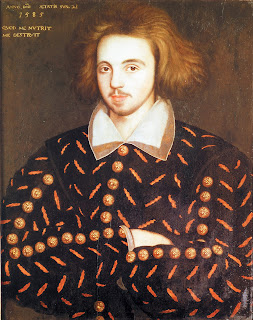Christopher Marlowe's "Dr. Faustus" is a renowned Elizabethan tragedy that explores themes of ambition, temptation, and the consequences of one's choices. It is a work of dramatic literature that, like most plays, has a well-defined structure consisting of a beginning, middle, and end. Contrary to the assertion that "Dr. Faustus" lacks a middle, it is crucial to understand the significance of the middle portion of the play in developing its characters, advancing the plot, and conveying its underlying message.
 |
| Christopher Marlowe |
During this middle phase, Faustus's character is on full display as he oscillates between moments of doubt and arrogance. He performs a series of magical feats, such as summoning spirits and engaging in various misadventures. These actions not only demonstrate the extent of his powers but also reveal his moral and emotional turmoil. It is in this middle section that Faustus's internal conflict becomes more pronounced, making him a complex and multidimensional character.
Furthermore, the middle of "Dr. Faustus" is instrumental in advancing the plot. It is during this phase that Faustus experiences the consequences of his choices, and the tension in the play steadily builds towards its tragic climax. As Faustus indulges in his magical abilities, he begins to realize the gravity of his pact with the devil. His initial excitement turns into desperation and regret, creating a sense of inevitability that propels the narrative forward.
The middle portion of the play also serves to reinforce the play's central themes. "Dr. Faustus" is a cautionary tale about the perils of unchecked ambition and the corrupting influence of power. In the middle, Faustus's relentless pursuit of knowledge and power illustrates the allure of these desires and the moral compromises individuals are willing to make to attain them. It is in this phase that the audience witnesses the tragedy of Faustus's choices, underscoring the play's moral message.
Maitland critiques the play's structure, finding flaws in its middle section that undermine the seriousness established in the beginning and end. He questions the lack of varied events over the 24-year span and the perceived undeservedness of Faustus' punishment. Hazlitt commends Marlowe for the passionate and imaginative writing, seeing Faustus as a personification of the pride of will and curiosity. Faust's sacrifice is viewed not as a selfish act but as a martyr's pursuit of knowledge for humanity's benefit. Lamb, however, criticizes Goethe's Faust for lacking the true spirit of curiosity embodied by Marlowe's Faustus. He applauds Marlowe's choice of Helen as a more noble mistress for a play of epic proportions. Broughton praises Marlowe's use of poetic language, particularly in Faustus' soliloquy about Helen. The superstitions of the Elizabethan audience during the devil scene are also highlighted. Hallam sees the play as a collection of sketches rather than a masterpiece due to trivial middle scenes. He appreciates Marlowe's Mephistopheles as more complex and interesting than Goethe's version. Lewes agrees with Hallam, stating that while the play has meaningful passages, it is weighed down by inconsequential humor. He attributes the play's fame to theatrical management rather than philosophical exploration. Wagner suggests that Marlowe uses trivial and comic scenes to convey the pointlessness of turning to the devil. However, he believes the struggle between passion and reason is not fully presented.
Overall, the critics reflect a range of perspectives on Marlowe's "Doctor Faustus," praising its passion and imagination while critiquing its structural flaws and the balance between serious themes and inconsequential elements. In conclusion, "Dr. Faustus" by Christopher Marlowe is a well-structured play that follows a traditional narrative structure with a distinct beginning, middle, and end. The middle portion of the play is far from nonexistent; it is, in fact, a crucial element in the development of the story, characters, and themes. It is where Dr. Faustus's character evolves, where the plot advances, and where the play's underlying messages are most profoundly conveyed. To overlook the middle of "Dr. Faustus" is to miss out on the heart of this timeless tragedy and its profound exploration of the human condition.
Dr. Faustus : Marlowe, Christopher, 1564-1593 : Free Download, Borrow, and Streaming : Internet Archive. (1994). Internet Archive. https://archive.org/details/drfaustus00marl
A Selection of Critical Essays of Marlowe’s Dr Faustus , Edit. Dyson . A. E. , The University Press, 1969
Read More:
👀The Centre of George Chapman's Plays is a Proud Character on Marlowe’s Model: Critically Discuss
👀Design of Christopher Marlowe's "Doctor Faustus": Most Rewarding type of Scholarship!!
👀English Playwright and Poet, Christopher Marlowe’s Contribution to English Drama
👀Character of young Mortimer in Christopher Marlowe’s, "Edward II"
👀Analysis of Christopher Marlowe’s "Edward II" as a Historical Play
👀Power and Suffering is one of the Themes of Christopher Marlowe's "Edward-II"
👀Christopher Marlowe’s Tragic Art in the Death Scene of “Edward II”

Comments
Post a Comment
Drop any query, suggestion or comment here.